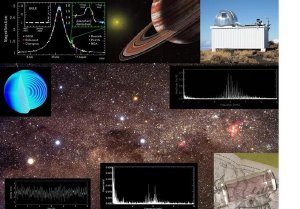Optical Surfaces Ltd. has announced the delivery, to the Niels Bohr Institute, of a pair of ultra high precison counter-rotating doublet prisms for the Atmospheric Dispersion Corrector (ADC) - a key element for the instruments** deployed by the SONG project.
The SONG project, is a collaboration between scientists at the Department of Physics and Astronomy, University of Aarhus, and the Niels Bohr Institute, University of Copenhagen. SONG stands for Stellar Observations Network Group and the purpose of the project is to design an observatory that consists of a network of telescopes distributed around the planet. The design of the SONG telescope will target two scientific purposes: it must measure stellar oscillations that can probe the internal structure of stars, and be able to find Earth-like planets in our Milky Way.

SONG will be a network of 1-metre class telescopes distributed worldwide for measurement of stellar oscillations and planet detection via microlensing events. Currently, the prototype telescope and instrument suite is being designed. Two Lucky Imaging cameras, observing in the VIS and RED bands, are situated at the Nasmyth focal station. Via a Coudé train, a f/37 beam can be fed to a high-resolution spectrograph. In order to deliver diffraction-limited performance, important especially for the observations in the VIS and RED bands with zenith distances of as much as 70 degrees, an Atmospheric Dispersion Corrector (ADC) was required. The ADC consists of a pair of counter-rotating doublet prisms to be placed approximately 75 cm before the focal plane, in the combined VIS/RED band.
Reflecting on their choice of supplier, Per Kjærgaard, SONG project Manager, commented: 'Optical Surfaces Ltd was selected to produce the critical ADC prism doublet because of their impressive track record in preparing high performance optical systems for telescope and space projects'.
Using proprietary production techniques, Optical Surfaces' skilled craftsmen produced two identical glass prisms of 45mm diameter with a surface accuracy of lambda/20 p-v and microroughness of better than 1nm rms to provide the diffraction-limited performance required by the SONG project team.
Optical Surfaces Ltd (www.optisurf.com) has been producing optical components and systems for more than 45 years and is now accepted as one of Europe's leading manufacturers of high-precision optics for satellite deployment and astronomical research. The company's ISO 9001-2000 approved manufacturing workshops and test facilities are deep underground in a series of tunnels excavated in solid chalk where temperature remains constant and vibration is practically non-existent. With such stable conditions testing, particularly with long path lengths, becomes quantifiable and reliable. Working with these natural advantages is a highly skilled team of craftsmen with a commitment to excellence in both product quality and customer service.
For further information relating to the SONG Project please visit http://astro.phys.au.dk/SONG/
For further information relating to ultra smooth optics for space observation please contact Optical Surfaces Ltd by telephone on +44-208-668-6126 or email [email protected]
** Including the Lucky Imaging cameras in the Nasmuth focal station and the spectrograph at the Coudé focu